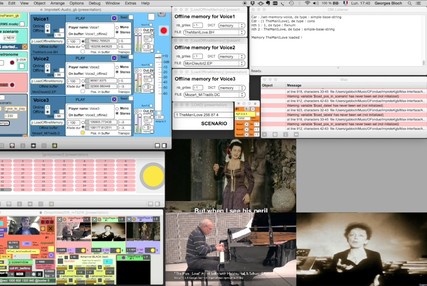En 2019, l’Ircam était partenaire de la première édition du festival international AIxMusic consacré aux liens entre intelligence artificielle et musique à Ars Electronica. Cette année, cette collaboration a été renouvelée pour une édition en ligne. L’Ircam travaille depuis des dizaines d’années autour de l’intelligence artificielle appliquée à la musique, et ce dans des domaines variés - la MAO, l’aide à l'orchestration, lle suivi de partition, les interfaces gestuelles, l’indexation musicale…
Avec l’évolution du « deep-learning » et la place croissante de l’intelligence artificielle dans les technologies et la recherche musicale, l’enjeu est ici est de voir ce que l’intelligence artificielle peut apporter sur le plan pratique et heuristique à la créativité artistique, plus précisément sur le thème de la générativité.
Vendredi 11 septembre, 16h00 - 16h05 (UTC +2)
AI Creative Agents: The Man I Love
une démonstration du projet Improtek, avec Hervé Sellin au piano (FR) et Remi Fox au saxophone (FR);
Vendredi 11 septembre, 16h05 - 16h25 (UTC +2)
Three Ladies Project
une performance de Georges Bloch (technologie Dicy2Li) enregistrée durant le festival Manifeste 2020.
Vendredi 11 septembre, 16h25 - 16h30 (UTC +2)
Little Etudes for Piano
une performance d'Elaine Chew (FR), une série de courtes pièces de piano avec des explications de Pier Lambiase (UK);
Vendredi 11 Septembre, 17h00 - 18h17 (UTC +2)
Conférence : Musical Generativities
un panel de discussion donné dans le cadre du Forum Vertigo 2020;
- Modérateur : Hugues Vinet (FR), Directeur de l'Innovation et de la Recherche
- Avec Douglas Eck (US), scientifique, Google Research
- Erin Gee, compositeur et professeur, Brandeis University
- Giulia Lorusso (IT), compositrice / Alessandro Rudi, chercheur à l'INRIA et à l'École Normale Supérieure
- Jérôme Nika (FR), chercheur
- Alexander Schubert (DE), musicien, interprète, compositeur
Samedi 12 septembre, 18h - 19h (UTC +2)
Can we do the same with less – AI in 64 Kb
Un atelier pour l’hackathon AIxMusic par Philippe Esling (FR) - Introduction aux techniques pour IA légère et démonstration des technologies emportées
Dimanche 13 septembre, 13h35 - 14h25 (UTC +2)
Frontiers of Music and Artificial Intelligence
un panel organisé par Elaine Chew (FR), et discussions avec Dorien Herremans (BE) et Philippe Esling (FR);



